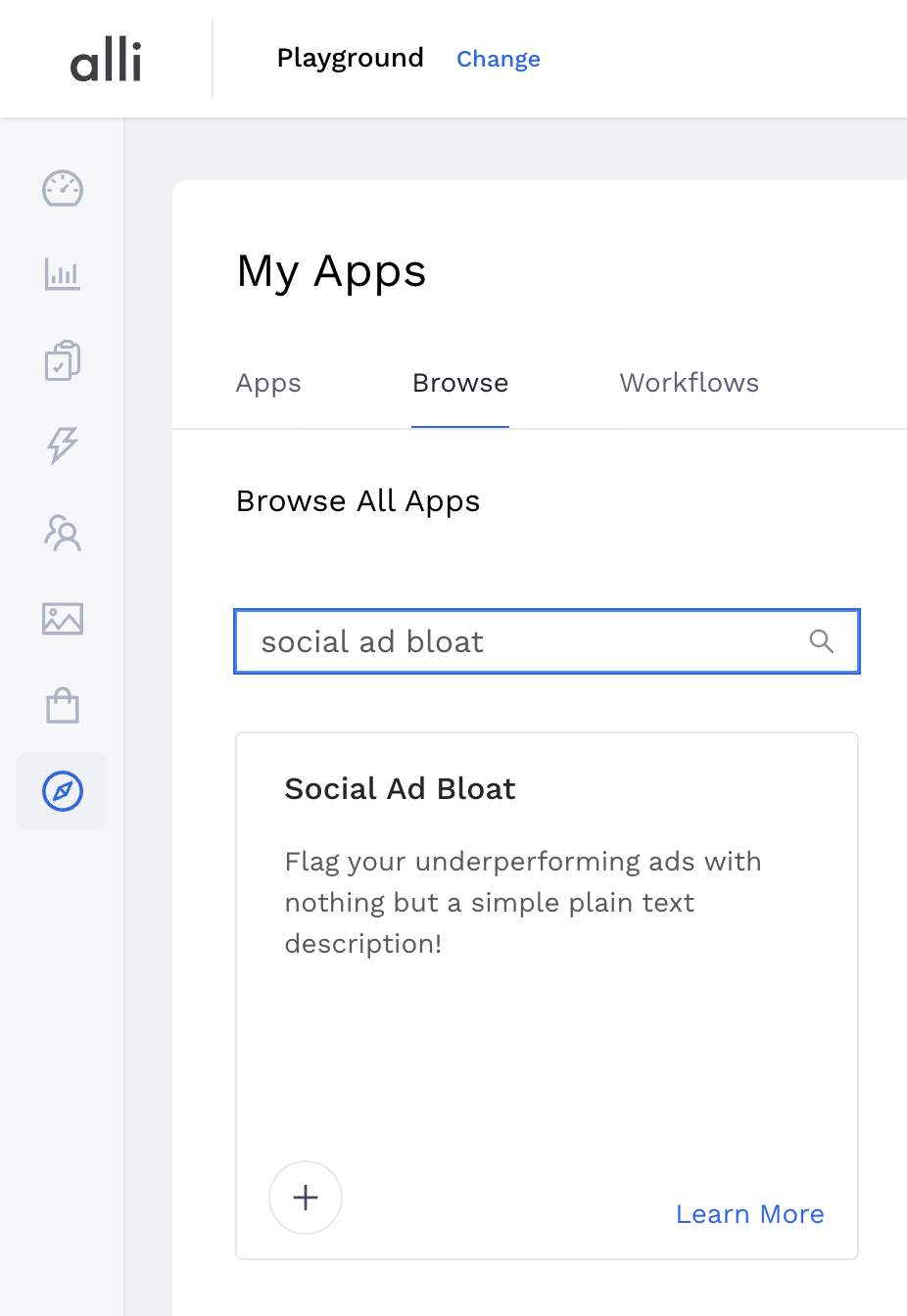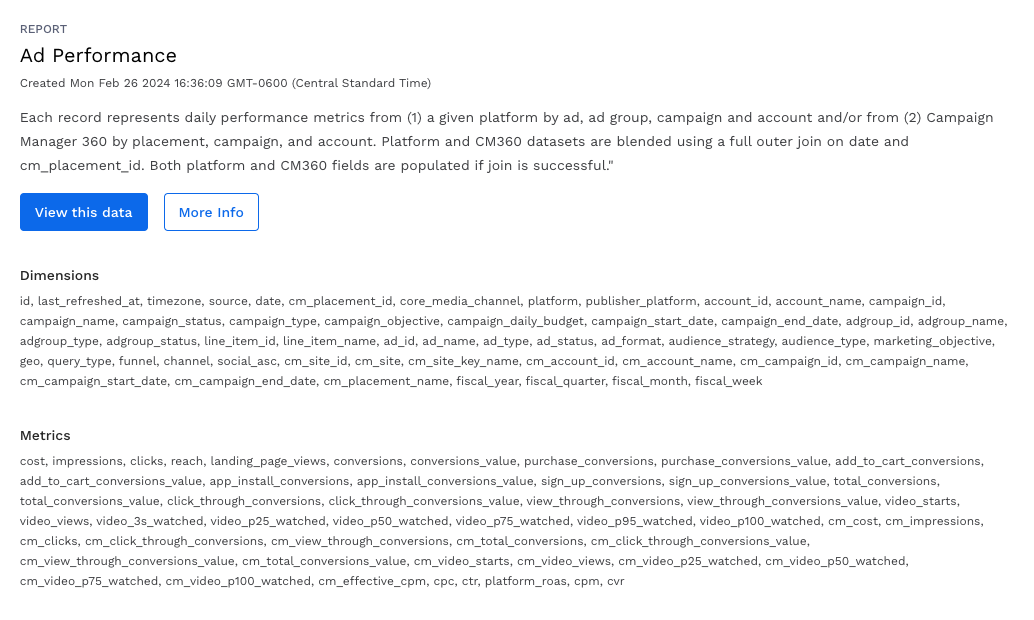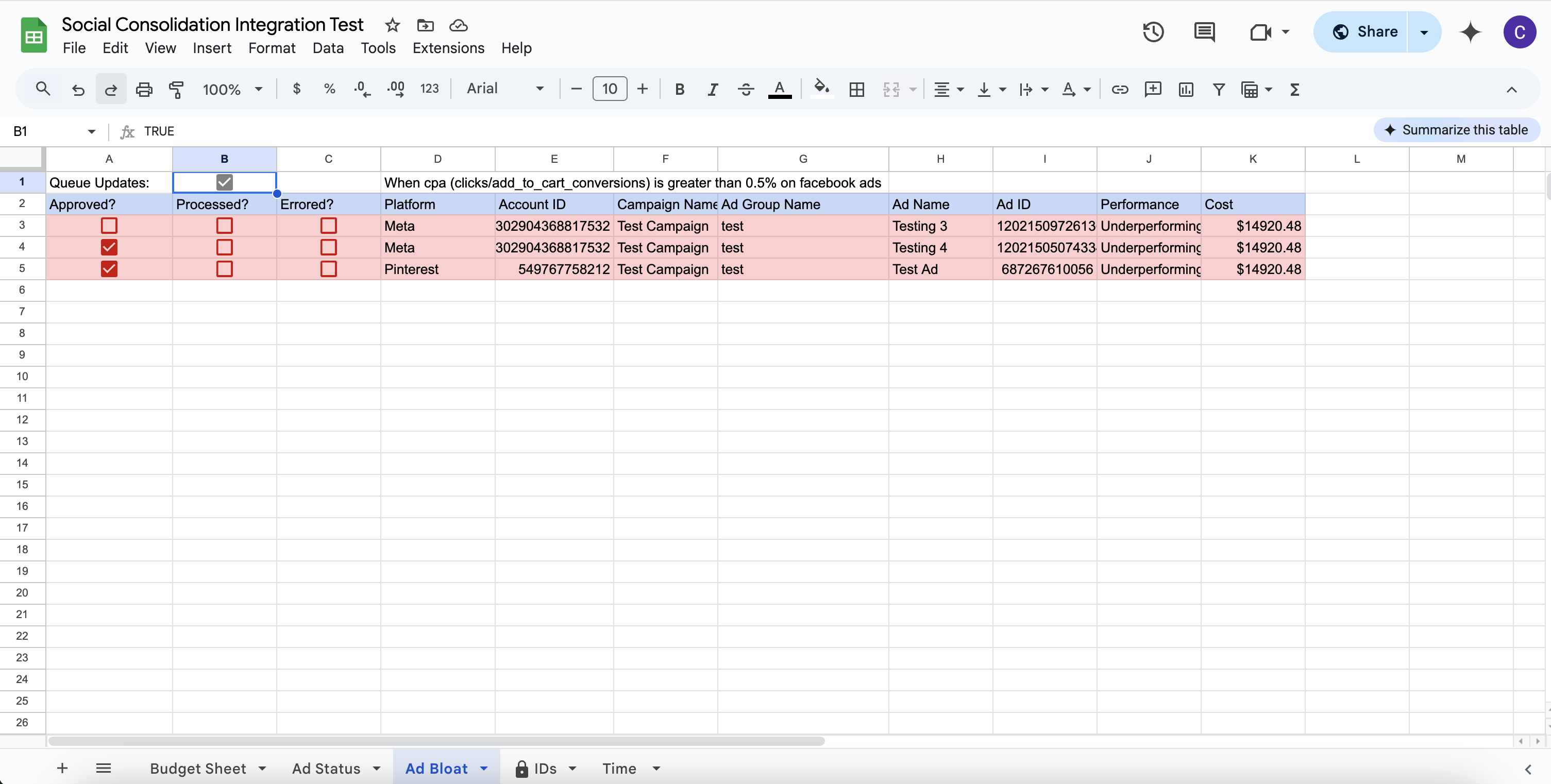When marketing on social platforms, it can be easy for underperforming ads to fall under the radar. This can result in spending precious dollars on poorly performing ads when they could be better utilized elsewhere. This is the problem that the Social Ad Bloat app aims to accomplish. The Social Ad Bloat app is a tool that flags your underperforming ads from nothing but a simple plain text description.
Installation and Setup
-
Setup your Google Sheet
-
The Social Ad Bloat project works with any google sheet new or existing (including your Budget Consolidation sheet if you have it set up)! Just share your google sheet of choice with your alli client service account and provide it editor access. Once the app runs for the first time, an “Ad Bloat” tab will automatically be created and populated for you!
-

b. Copy the Sheet ID of the google sheet

-
Setup Slack Integration
-
Go to the slack channel you want messages sent in
-
Open the channel settings and select the Integrations tab.
-
Select Add Apps. Search for “Alli Social Automation” and hit Add.
-
-
Setup Marketplace App
-
First, find the app on marketplace named “Social Ad Bloat” and click the install button ➕
-
Then, fill out the template variables
-
Finally, set your schedule, click

-

Template Variables
|
Variable Name |
Description |
|---|---|
|
SHEET_ID |
The ID corresponding to the Google Sheet where you want to view your underperformers |
|
LOOKBACK_DAYS |
The number of days you would like to backfill your data (would you like ROAS to be aggregated over the last week or last month?) |
|
MIN_RUN_DAYS |
The minimum days an ad must have run for it to be displayed |
|
PROMPT |
A description of your underperforming ads (i.e. “ads that fall below the campaign's average ROAS”) |
|
SLACK_USERS |
A list of emails belonging to users you would like to be mentioned in the slack message separated by commas and no spaces (i.e. “user1@pmg.com,user2@pmg.com”) |
|
SLACK_CHANNEL |
The slack channel for alerts to be sent to. Make sure that the slack channel is public |
|
SOURCE_NAME |
The name of the analytics table you want to pull data from (optional) |
|
AD_ID_COLUMN |
The column name that represents the ad ID in the given analytics table (only include if SOURCE_NAME is included and that table's ad ID column isn't called "ad_id") |
|
DATE_COLUMN |
The column name that represents the date in the given analytics table (only include if SOURCE_NAME is included and that table's date column isn't called "date") |
Prompt Design
Some tips for designing successful prompts:
-
Ensure the prompt is a description of the ads (i.e. “ads where…”).
-
Avoid including date instructions that can be handled in the LOOKBACK_DAYS and MIN_RUN_DAYS variables (instead of saying “ads within the last 7 days” in your prompt, set LOOKBACK_DAYS to 7)
-
note: any query referencing date instructions will fail. This is because the application already filters the data with the look back window and removes the date column.
-
-
All data used in the app comes directly from the Ad Performance datasource, unless an analytics table is included under SOURCE_NAME, in which case data will come from that table and Ad Performance. When designing a prompt, ensure that it is possible using data from the datasources it is set up with.
-
Try to avoid abbreviations for KPIs and include the description/formula to calculate them instead (“cost per click“ instead of “CPC”).
-
If you tell the app to search for ads using a specific phrase, make sure to note if it needs to be not case specific. For example, if you want to select ads with “evergreen” in the campaign name but also want to include ads with “Evergreen” or “EVERGREEN” in the campaign name, say something like “ads with evergreen in the campaign name (not case specific)”.

Examples of Bad Prompts:
|
Prompt |
Reasoning |
Better |
|---|---|---|
|
Pause all ads where CPM is greater than $10 |
Avoid instructing through the prompt and just describe the ads |
Ads where CPM is greater than $10
|
|
Ads where CPM is above average for campaigns that have run for 10 days |
As the variable MIN_RUN_DAYS can remove all ads that haven't run for 10 days, use that instead to take stress off of the tool |
Ads where CPM is above average for its campaign |
Examples of Good Prompts:
-
Ads in the top ten percent of spend for each campaign
-
Ads $0.5 or more above campaign average cost per click on Australia campaigns
-
Ads in the top ten percent of spend for conversion ads and ads below 10000 impressions for consideration ads
Troubleshooting
Failed to generate SQL. Please try again with a different prompt
This error means the LLM was unable to create working SQL for your prompt. The best way to troubleshoot these errors is to try editing the prompt to better abide by the guidelines outlined in prompt design and run the app again. Be sure to change the prompt as submitting the same prompt multiple times in a row will result in the same error.
Slack permission error
This means that the Slack Bot does not have access to the channel you provided. Try adding the “Alli Social Automation” app to your channel in order to avoid this error.
Getting Help
If all else fails, submit a ticket to the help desk
Integration with Social Consolidation
By integrating Ad Bloat with Social Consolidation, you can pause the flagged ads straight from the Google Sheet! Just make sure that the sheet you are using for Ad Bloat is the same one you have set up for Social Consolidation. Then, share your client’s service account with the Social Consolidation Google Sheet.
Select which ads you want to pause, and then check the Queue Updates toggle when you are ready. The next time Social Consolidation runs (normally every 15 minutes), your ads will automatically pause.
Ensure all tab names are left unchanged (“Budget Sheet”, “Ad Status” and “Ad Bloat”)
